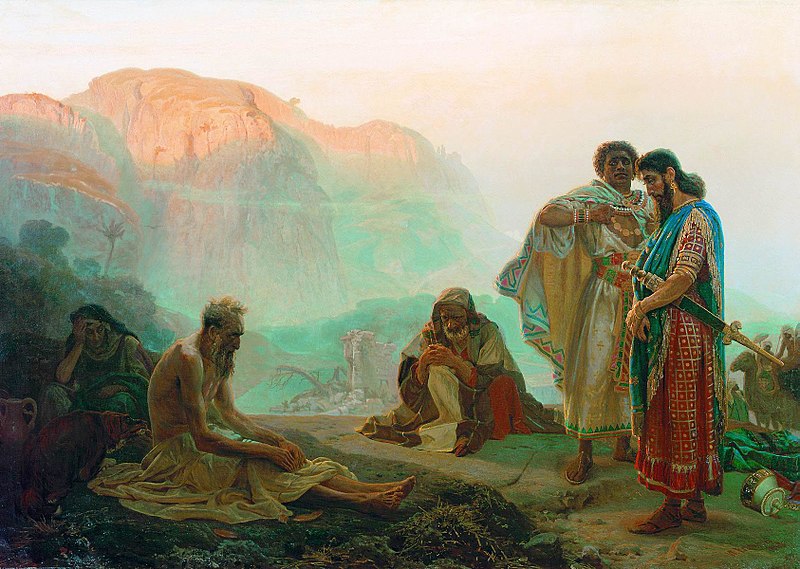12 June. Job’s friends discuss why people suffer
“After seven days, Job cried out and cursed the day he had been born, saying, ‘Let the day I was born be destroyed, and the night it was said, “A boy is born!” Let that day turn to darkness… Why didn’t I die as soon as I was born? Why didn’t I die when I came out of the womb? ... Why is life given to those who are so unhappy? They want to die, but death does not come…’”
“Then Eliphaz the Temanite answered, ‘Your words have comforted those who fell, and you have strengthened those who could not stand. But now trouble comes to you, and you are discouraged; trouble hits you, and you are terrified. You should have confidence because you respect God; you should have hope because you are innocent…’”
“Then Job answered, ‘I wish my suffering could be weighed and my misery put on scales. My sadness would be heavier than the sand of the seas. No wonder my words seem careless. The arrows of the Almighty are in me; my spirit drinks in their poison; God’s terrors are gathered against me…’”
“Then Bildad the Shuhite answered: ‘How long will you say such things? Your words are no more than wind. God does not twist justice; the Almighty does not make wrong what is right. Your children sinned against God, and he punished them for their sins. But you should ask God for help and pray to the Almighty for mercy. If you are good and honest, he will stand up for you and bring you back where you belong.’”
“Then Job answered, ‘Yes, I know that this is true, but how can anyone be right in the presence of God? ... If he snatches something away, no one can stop him or say to him, “What are you doing?” God will not hold back his anger.’”
“Then Zophar the Naamathite answered: … ‘Can you understand the secrets of God? Can you search the limits of the Almighty? ... Put away the sin that is in your hand; let no evil remain in your tent. Then you can lift up your face without shame, and you can stand strong without fear.’”
“Then Job answered: … ‘My friends all laugh at me when I call on God and expect him to answer me; they laugh at me even though I am right and innocent! ... You should not unfairly choose his side against mine; you should not argue the case for God.’”
(Job 3:1-4,11,20; 4:1-6; 6:1-4; 8:1-6; 9:1-2,12-13; 11:1,7,14-15; 12:1,4; 13:7-8)

In today’s selection of verses from the Book of Job, Job’s friends Eliphaz, Bildad and Zophar discuss the calamities that have fallen on Job. They try to equate Job’s suffering with a God who, according to their understanding, rewards goodness with wealth but punishes wrongdoing with sickness.
They, like Job, cannot understand how God can let so much ill fortune and sickness happen to a good man who respects God and keeps his commands. Many people ask the same question today: Why do good people suffer?
The belief behind the arguments of Job’s friends is pure Old Testament theology. The Israelites believed that anyone who kept God’s laws would be rewarded with prosperity and good health. It followed, therefore, that anyone like Job who suffered an economic downturn or fell ill was being punished by God for wrongdoing.
Bildad points out, “Your children sinned against God, and he punished them for their sins” (Job 8:4) and he adds, “If you are good and honest, he will … bring you back where you belong.” (Job 8:6) Job replies, “but how can anyone be right in the presence of God?” (Job 9:2)
Zophar pleads with Job, “Put away the sin that is in your hand... Then you can lift up your face without shame” (Job11:14), while Job maintains his innocence: “My friends all laugh at me when I call on God … they laugh at me even though I am right and innocent!” (Job 12:4)
This is the same Old Testament Jewish thinking that Jesus confronted head on when he healed a man who had been blind from birth. The Jewish crowds were convinced that the man was blind because either he or his parents had sinned against God; so God was ‘punishing’ the man with blindness. They asked Jesus, “Whose sin caused this man to be blind – his own sin or his parents’ sin?” (John 9:2) But Jesus demolished the whole basis of their mistaken theology: “It is not this man’s sin or his parents’ sin that made him be blind. This man was born blind so that God’s power could be shown in him.” (John 9:3)
Job’s friends try to blame Job’s bad fortune and his ill health on God’s punishment for his sin; but the whole point of this story is that Job was the most God-fearing and godly man on the planet (see Job 1:8). In no way could his suffering be seen as the result of God’s punishment for sin.
So why do 'good' people like Job suffer bad fortune or ill health? The answer is ‘we don’t know’; but misfortune or ill health are certainly not punishments from God!
The photo shows a painting of ‘Job and His Friends’ by Ilya Repin (1869).
You can read more about Job @ https://www.thebiblejourney.org/biblejourney2/28-the-israelites-face-continuing-opposition/job-is-faced-with-adversity/
